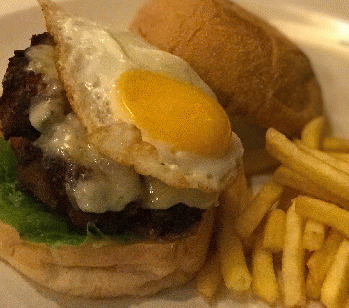
Cheeseburgers with fried egg ... a new American staple apparently.
(Image by Twitter User oldswissinn) Details DMCA
By Bob Gaydos
"Write about something other than him," my inner voice said.
"Write about something other than him," she pleaded.
"I'll try," I said. "I'll really try."
***
" So I was scrolling through my Facebook feed the other night when a photo grabbed my attention and made me stop and look at it more closely. It was a promotion for an eatery in my vicinity and the obvious attempt was to be as mouth-wateringly appetizing as possible. Good idea if you're selling food.
For me, however, the effect was heart-stoppingly different. The photo was of a burger, but not just any burger. In today's highly competitive world of restaurants, even a burger has got to be somehow special. Bigger. Untraditional. Jam-packed. For me, this one definitely qualified. In addition to the hefty bun and lots of char-broiled ground beef, it included a slice of cheddar cheese, two slices of bacon, tons of fried onions and -- this is what got my attention -- a fried egg to top it all off.
Be still my heart, is obviously the response the creators were hoping for. Heart-attack special, I thought. Do people actually eat those things? I wondered. Is the egg really necessary? I asked Google.
Apparently, yes, such burgers are not only eaten. but there is a competition to see who can pile as many calories and as much fat and cholesterol into cheeseburgers and market them as great sources of protein.
I get it. People love it. They eat it up.
Well, some people. People who are concerned that they are overweight, or have high blood pressure, or diabetes, or high cholesterol, or heart disease -- which is millions of Americans by the way -- are not necessarily enamored of the super burger. Nor are people who are simply interested in living a longer, healthier life, Certainly they don't make these burgers a regular part of their diet.
Again, what struck me was the fact that this burger was apparently not so special in that lots of food establishments -- fast and not-so-fast food -- offer some variation of the heart-stopper. A lot of Americans do eat this way fairly regularly. Even as the fast-food giants scramble to put more healthful-sounding (if not actually healthful) items on their menus, the kitchen-sink burger reigns supreme and lean (as in meat) is mean. Fat's still where it's at.
Listen, what you eat is your business and nobody likes a know-it-all or scold, especially when it comes to food. I don't expect to change anybody's diet by pointing out that the federal government's 2015-2020 Dietary Guidelines for Americans recommend keeping your body's cholesterol levels low by eating as little dietary cholesterol as possible. There are no limits, true, but the body makes its own cholesterol and doesn't need help from such foods as red meat, egg yolks, dairy products, butter. Overdone, they tend to clog things (arteries) up. The guidelines also suggest you really want to limit your sodium intake, eat very little in the way of added sugars and saturated fats (regular ground beef, baked goods, cheese, pizza, French fries, ice cream) and no trans fats (baked goods, fried foods, packaged foods).
That's pretty much your whole diet, right? It used to be mine. But, as I said, it's your choice. I chose a few years ago -- after a warning about being overweight and having high cholesterol and blood sugar counts -- to pretty much eliminate red meat from my diet and to significantly reduce sugar (which contributes to cholesterol and heart disease problems), salt and unhealthy fats from my diet. I had help making that decision.
I cheat only rarely, have lost significant weight and -- other than some bones broken in a recent auto accident -- am in pretty good health for a 76-year-old. I do not deprive myself of foods I love that aren't going to wreak havoc on my body. I also don't drink alcohol or smoke.
(Note: You can view every article as one long page if you sign up as an Advocate Member, or higher).





